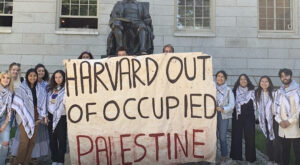Student protests on Israel, Hamas highlight Harvard hypocrisy on campus ‘speech codes’
Widespread protests on university campuses involving pro-Hamas and pro-Israeli groups have shined a spotlight on college speech codes and the bias inherent in banning free…

Widespread protests on university campuses involving pro-Hamas and pro-Israeli groups have shined a spotlight on college speech codes and the bias inherent in banning free speech.
“We’re seeing a lot of instances of universities refraining from using these policies against the student protests either because the administrators agree with the students or because it would be too much of a nightmare to punish this political speech,” Program Officer Zach Greenberg at the Foundation for Individual Rights and Expression (FIRE) told The Lion. “But it is a bit of a tension between these policies and the students protesting.”
Part of the tension comes from the fact that both the pro-Hamas factions and the pro-Israeli factions enjoy considerable support among progressives at universities.
One example of where that tension exists is at Harvard University, which FIRE has ranked dead last in the nation when it comes to enabling free speech on campus: a dreadfully perfect 0.0 score in protecting freedom of expression, categorized as “abysmal” by FIRE.
But suddenly, now that both sides of an issue in the Hamas-versus-Israel debate enjoy considerable progressive support, Harvard is eager to waive the free speech flag, declaring its commitment to free speech, come what may.
“Our University embraces a commitment to free expression,” Harvard President Claudine Gay wrote in a statement about students protesting on campus regarding the conflict in the Middle East, according to the Boston Herald. “That commitment extends even to views that many of us find objectionable, even outrageous. We do not punish or sanction people for expressing such views. But that is a far cry from endorsing them.”
It’s also a far cry from past survey responses to FIRE from actual Harvard students, who expressed fear that their views on unpopular political topics make them a target at the university, forcing them to practice self-censorship, leading to isolation: 53% of Harvard students reported self-censoring on campus at least once or twice a month.
“I often avoid posting controversial takes on social media tied to my name because I am afraid they might be misconstrued by my classmates or admin,” said one such survey response shared by FIRE.
In addition, 58% of students similarly say they are worried about damaging their reputation because someone misunderstands something they have said or done, reported FIRE.
Another survey respondent said being a Republican at Harvard – which has a ratio of 3-to-1 liberal over conservative students, according to FIRE statistics – leads the students to isolation.
“Despite having friends and a strong social support network on campus, I felt very alone,” the respondent from the Class of ‘24 said. “I am a moderate Republican, and even opinions I possess that are moderate or even left leaning on the national scale seem relatively unaccepted among the student body. It is an incredibly difficult and isolating political landscape to navigate for someone who is not left-wing.”
For now, FIRE’s Greenberg said it’s too early to tell if the sudden embrace of free speech on college campuses created by these protests will be lasting.
“We will have to wait to see how this all plays out,” Greenberg told The Lion.
Greenberg has been urging universities to adopt institutional neutrality.
Instead of a university condemning or condoning political viewpoints, which has tended to chill free speech, universities should recognize that they are the neutral house for all of the students, regardless of their political views, he added.
“We urge the universities to revise their policies to better protect free speech and to make clear to students that they will not be punished for protesting either side of this issue or any other controversial issues out there as well,” Greenberg concluded.



